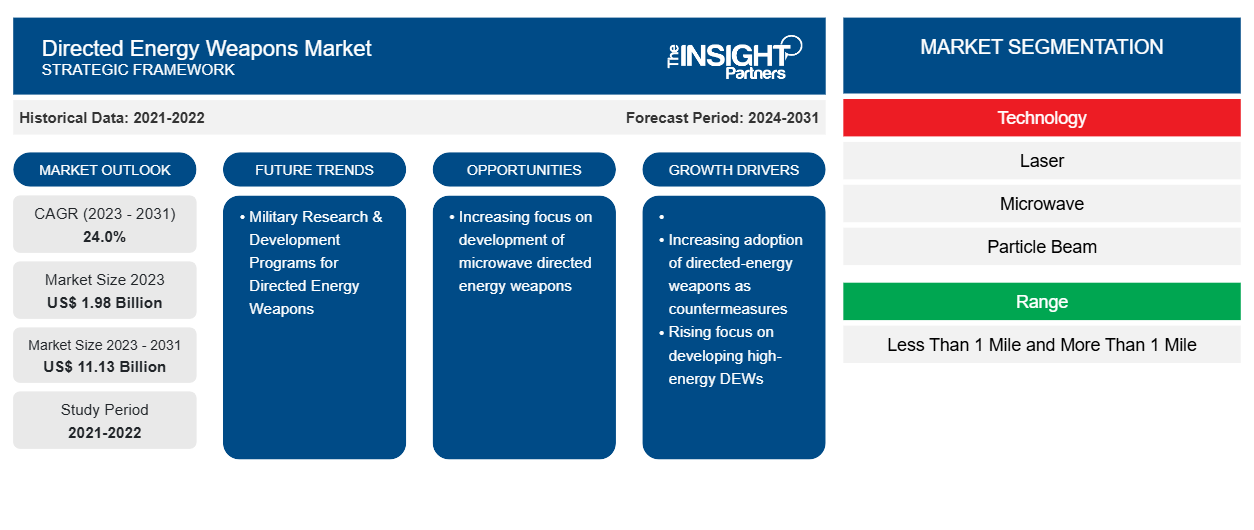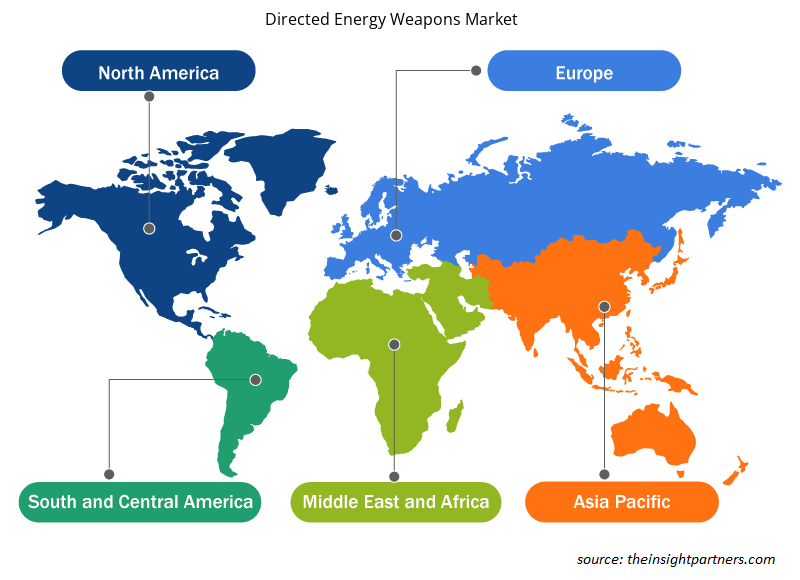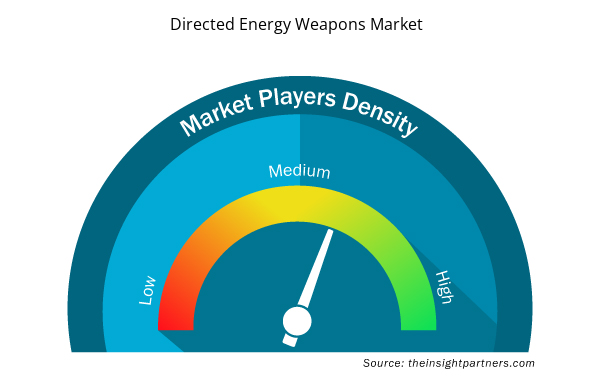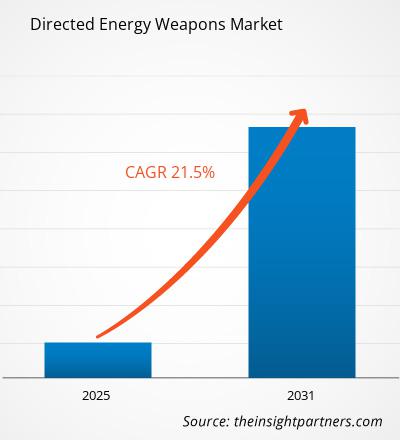Si prevede che la dimensione del mercato delle armi a energia diretta raggiungerà i 10,27 miliardi di dollari entro il 2031, rispetto ai 2,62 miliardi di dollari del 2024. Si prevede che il mercato registrerà un CAGR del 21,50% nel periodo 2025-2031. È probabile che la crescente attenzione allo sviluppo di armi a energia diretta a microonde rimanga una tendenza chiave nel mercato.
Analisi del mercato delle armi ad energia diretta
Gli stakeholder chiave nel mercato delle armi ad energia diretta includono produttori di componenti, produttori di DEW, fornitori di tecnologia e utenti finali. L'ecosistema del mercato dei sistemi di armi ad energia diretta comprende i seguenti stakeholder: produttori di componenti, produttori di DEW e forze di difesa. Gli attori del mercato della produzione di sistemi di armi ad energia diretta acquistano componenti come sensori, supporti di tracciamento, rilevatori di fascio e altri pezzi di ricambio da vari fornitori in tutto il mondo. Alcuni dei produttori di componenti sono Lockheed Martin Corporation, Raytheon Technologies, Northrop Grumman Corporation e Boeing Company, tra gli altri. Questi fornitori ottimizzano costantemente le loro linee di produzione e i tempi di consegna per migliorare le rispettive catene di fornitura. I produttori di sistemi di armi ad energia diretta stanno assistendo a una domanda significativa per i loro prodotti a causa della crescente minaccia degli UAV negli ultimi anni. Il fornitore di DEW lavora in sincronia con l'acquirente del sistema di armi ad energia diretta per comprendere la domanda dell'acquirente o degli utenti finali. Ciò aiuta i produttori di DEW a soddisfare adeguatamente le esigenze dei rispettivi clienti. Le forze di difesa sono gli utenti finali, che continuano a cercare sistemi di armi laser ad alta energia, alta precisione e a lungo raggio per la loro flotta di difesa. Diverse forze di difesa lavorano a stretto contatto con i produttori di DEW come Raytheon Technologies, Lockheed Martin Corporation e altri per incorporare il miglior sistema possibile nella flotta di difesa. Questo fattore spinge anche il mercato delle armi a energia diretta.
Panoramica del mercato delle armi ad energia diretta
Negli ultimi dieci anni, le forze di difesa hanno cercato il sistema di armi ad energia diretta. I sistemi DEW basati su microonde hanno attratto diverse forze di difesa in tutto il mondo. Tuttavia, i sistemi DEW sono ancora in fase di sviluppo/prototipazione in molti paesi. L'esistenza di una tecnologia sostitutiva è un parametro chiave che i produttori di armi ad energia diretta devono sottolineare. L'arma ad energia diretta è uno dei prodotti chiave della sicurezza e della protezione e molti altri tra le forze di difesa. Pertanto, un sostituto completo non è disponibile sul mercato nello scenario attuale.
Personalizza questo report in base alle tue esigenze
Riceverai la personalizzazione gratuita di qualsiasi report, comprese parti di questo report, o analisi a livello nazionale, pacchetto dati Excel, oltre a usufruire di grandi offerte e sconti per start-up e università
Mercato delle armi ad energia diretta: approfondimenti strategici

- Scopri le principali tendenze di mercato in questo rapporto.Questo campione GRATUITO includerà analisi di dati che spaziano dalle tendenze di mercato alle stime e alle previsioni.
Driver e opportunità del mercato delle armi ad energia diretta
Aumento continuo della domanda da parte delle diverse forze di difesa
Il mercato delle armi a energia diretta in tutto il mondo comprende diversi produttori. Gli utenti finali delle armi a energia diretta includono produttori di aerei da difesa, navi militari, produttori di veicoli terrestri da difesa e forze di difesa. Poiché le armi a energia diretta sono tra le tecnologie emergenti nel settore della difesa, la domanda per le stesse è elevata. Per quanto riguarda la domanda più elevata, diversi noti appaltatori della difesa si sono avventurati nel mercato. La presenza di molti fornitori di armi a energia diretta ha aumentato il potere contrattuale degli acquirenti. Nel corso degli anni, con l'aumento del numero di utenti finali, si prevede che il potere contrattuale degli acquirenti aumenterà.
Programmi di ricerca e sviluppo militare per armi ad energia diretta
L'affidabilità migliorata del sistema è una considerazione fondamentale quando si sceglie un'arma ad energia diretta. L'uso di tecnologie all'avanguardia con l'integrazione di componenti hardware si diffonde in una gamma di risorse militari, come veicoli da combattimento , oggetti non identificati, droni e UAV. Le moderne armi ad energia diretta con una precisione eccezionale hanno reso necessario per le nazioni con controversie di confine e minacce regionali fare affidamento su tali armi all'avanguardia per la sicurezza dei loro confini. Ad esempio, il programma di sviluppo del dimostratore di energia diretta della Missile Defense Agency (MDA) mira alla riduzione del rischio tecnico e alla maturazione per laser strategici ad alta potenza, controllo del raggio, letalità e tecnologie associate. I futuri sistemi DEW saranno sicuramente sviluppati più potenti dei sistemi attuali utilizzando la tecnologia realistica dell'amplificatore klystron, come riportato dai ricercatori cinesi. Ad esempio, a Shanghai, i ricercatori stanno sviluppando un sistema DEW per abilitare una gittata di tiro di colpi laser da 100 petawatt entro il 2023. Tali fattori probabilmente forniranno nuove opportunità per i venditori di mercato nei prossimi anni.
Analisi della segmentazione del rapporto di mercato sulle armi ad energia diretta
I segmenti chiave che hanno contribuito alla derivazione dell'analisi del mercato delle armi ad energia diretta sono tecnologia, applicazione, gittata e piattaforma.
- In base alla tecnologia, il mercato delle armi a energia diretta è suddiviso in laser, microonde, fascio di particelle e altri. Il segmento laser ha detenuto una quota di mercato maggiore nel 2023.
- In base all'applicazione, il mercato delle armi a energia diretta è segmentato in terrestre, navale e aereo. Il segmento terrestre ha detenuto una quota di mercato maggiore nel 2023.
- In base alla portata, il mercato è segmentato in meno di 1 miglio e più di 1 miglio. Il segmento XX ha detenuto la quota maggiore del mercato nel 2023.
- In termini di piattaforma, il mercato è segmentato in veicoli blindati, sistemi senza pilota, sistemi portatili, sistemi aerei, navi e sottomarini e altri. Il segmento dei veicoli blindati ha detenuto una quota significativa del mercato nel 2023.
Analisi della quota di mercato delle armi ad energia diretta per area geografica
L'ambito geografico del rapporto sul mercato delle armi ad energia diretta è suddiviso principalmente in cinque regioni: Nord America, Europa, Asia Pacifico e resto del mondo.
Il Nord America ha dominato il mercato nel 2023 e si prevede che manterrà il suo predominio anche durante il periodo di previsione. È probabile che l'Europa mantenga la sua seconda posizione più grande nel mercato durante il periodo di previsione, seguita dalla regione Asia-Pacifico. In Nord America, gli Stati Uniti sono il paese più sviluppato. Poiché il paese è uno dei primi ad adottare le tecnologie, l'adozione di armi ad energia diretta è elevata nella regione nordamericana. Negli Stati Uniti si assiste a un maggiore avanzamento delle armi ad energia diretta rispetto ad altri paesi del mercato globale. La crescente collaborazione e partnership del governo degli Stati Uniti con aziende leader come Lockheed Martin Corporation, Raytheon Technologies Corporation e Boeing, tra le altre, sta accelerando la crescita del paese. L'accettazione di sistemi d'arma avanzati da parte del governo degli Stati Uniti incoraggia i produttori di sistemi di armi laser a fornire soluzioni laser più innovative per gli Stati Uniti. Si stima che la regione nordamericana crescerà al tasso primario negli anni fino al 2031 a causa della forte presenza di produttori di armi ad energia diretta e di una spesa militare significativamente più elevata anno dopo anno. Questi parametri stimolano costantemente il mercato delle armi ad energia diretta a crescere nel periodo di previsione.
Approfondimenti regionali sul mercato delle armi ad energia diretta
Le tendenze regionali e i fattori che influenzano il mercato delle armi a energia diretta durante il periodo di previsione sono stati ampiamente spiegati dagli analisti di Insight Partners. Questa sezione discute anche i segmenti e la geografia del mercato delle armi a energia diretta in Nord America, Europa, Asia Pacifico, Medio Oriente e Africa e America meridionale e centrale.

- Ottieni i dati specifici regionali per il mercato delle armi ad energia diretta
Ambito del rapporto sul mercato delle armi ad energia diretta
| Attributo del report | Dettagli |
|---|---|
| Dimensioni del mercato nel 2024 | 2,62 miliardi di dollari USA |
| Dimensioni del mercato entro il 2031 | 10,27 miliardi di dollari USA |
| CAGR globale (2025 - 2031) | 21,50% |
| Dati storici | 2021-2023 |
| Periodo di previsione | 2025-2031 |
| Segmenti coperti | Per tecnologia
|
| Regioni e Paesi coperti | America del Nord
|
| Leader di mercato e profili aziendali chiave |
|
Densità degli attori del mercato delle armi ad energia diretta: comprendere il suo impatto sulle dinamiche aziendali
Il mercato delle armi a energia diretta sta crescendo rapidamente, spinto dalla crescente domanda degli utenti finali dovuta a fattori quali l'evoluzione delle preferenze dei consumatori, i progressi tecnologici e una maggiore consapevolezza dei benefici del prodotto. Con l'aumento della domanda, le aziende stanno ampliando le loro offerte, innovando per soddisfare le esigenze dei consumatori e capitalizzando sulle tendenze emergenti, il che alimenta ulteriormente la crescita del mercato.
La densità degli operatori di mercato si riferisce alla distribuzione di aziende o società che operano in un particolare mercato o settore. Indica quanti concorrenti (operatori di mercato) sono presenti in un dato spazio di mercato in relazione alle sue dimensioni o al valore di mercato totale.
Le principali aziende che operano nel mercato delle armi ad energia diretta sono:
- Società per azioni Lockheed Martin
- Gruppo Talete
- L3Harris Technologies, Inc.
- Azienda
- Società di tecnologie Raytheon
Disclaimer : le aziende elencate sopra non sono classificate secondo un ordine particolare.

- Ottieni una panoramica dei principali attori del mercato delle armi ad energia diretta
Notizie e sviluppi recenti sul mercato delle armi ad energia diretta
Il mercato delle armi a energia diretta viene valutato raccogliendo dati qualitativi e quantitativi post-ricerca primaria e secondaria, che includono importanti pubblicazioni aziendali, dati associativi e database. Di seguito sono elencati alcuni degli sviluppi nel mercato delle armi a energia diretta:
- Lockheed Martin (NYSE: LMT) si è aggiudicata un contratto per sviluppare e consegnare fino a quattro sistemi di armi laser da 300 kW al programma prototipo Indirect Fire Protection Capability-High Energy Laser (IFPC-HEL) dell'esercito statunitense. Il sistema IFPC-HEL integra altri componenti di difesa a strati per proteggere i soldati da minacce stressanti, sistemi aerei senza pilota, razzi, artiglieria e mortai, insieme ad aeromobili ad ala fissa e rotante. (Fonte: Lockheed Martin Corporation, comunicato stampa, ottobre 2023)
Raytheon UK è pronta a ricevere il suo primo sistema di armi laser ad alta energia da testare e integrare nel Regno Unito, segnando un significativo progresso nella comprensione di come tali sistemi possano essere impiegati. (Fonte: Raytheon Technologies, comunicato stampa, settembre 2023)
Copertura e risultati del rapporto sul mercato delle armi ad energia diretta
Il rapporto "Dimensioni e previsioni del mercato delle armi ad energia diretta (2021-2031)" fornisce un'analisi dettagliata del mercato che copre le seguenti aree:
- Dimensioni e previsioni del mercato delle armi ad energia diretta a livello globale, regionale e nazionale per tutti i segmenti di mercato chiave coperti dall'ambito
- Tendenze del mercato delle armi ad energia diretta e dinamiche di mercato come fattori trainanti, limitazioni e opportunità chiave
- Analisi dettagliata delle cinque forze di Porter
- Analisi del mercato delle armi ad energia diretta che copre le principali tendenze del mercato, il quadro globale e regionale, i principali attori, le normative e i recenti sviluppi del mercato
- Analisi del panorama industriale e della concorrenza che copre la concentrazione del mercato, l'analisi della mappa di calore, i principali attori e gli sviluppi recenti per il mercato delle armi ad energia diretta
- Profili aziendali dettagliati
- Analisi storica (2 anni), anno base, previsione (7 anni) con CAGR
- Analisi PEST e SWOT
- Valore/volume delle dimensioni del mercato - Globale, regionale, nazionale
- Industria e panorama competitivo
- Set di dati Excel



Report Coverage
Revenue forecast, Company Analysis, Industry landscape, Growth factors, and Trends

Segment Covered
This text is related
to segments covered.

Regional Scope
North America, Europe, Asia Pacific, Middle East & Africa, South & Central America

Country Scope
This text is related
to country scope.
Domande frequenti
North America region dominated the directed energy weapons market in 2023.
Increasing focus on development of microwave directed energy weapons is one of the major trends of the market.
Increasing adoption of directed-energy weapons as countermeasures and rising focus on developing high-energy DEWs are some of the factors driving the growth for directed energy weapons market.
The estimated value of the directed energy weapons market by 2031 would be around US$ 10.27 billion.
Lockheed Martin Corporation, Thales Group, L3Harris Technologies, Elbit Systems, Raytheon Technologies Inc, BAE Systems Plc, Moog Inc, Honeywell Aerospace Inc, Boeing, and Rheinmetall AG are some of the key players profiled under the report.
The directed energy weapons market is likely to register of 21.50% during 2023-2031.
Trends and growth analysis reports related to Aerospace and Defense : READ MORE..
The Insight Partners performs research in 4 major stages: Data Collection & Secondary Research, Primary Research, Data Analysis and Data Triangulation & Final Review.
- Data Collection and Secondary Research:
As a market research and consulting firm operating from a decade, we have published and advised several client across the globe. First step for any study will start with an assessment of currently available data and insights from existing reports. Further, historical and current market information is collected from Investor Presentations, Annual Reports, SEC Filings, etc., and other information related to company’s performance and market positioning are gathered from Paid Databases (Factiva, Hoovers, and Reuters) and various other publications available in public domain.
Several associations trade associates, technical forums, institutes, societies and organization are accessed to gain technical as well as market related insights through their publications such as research papers, blogs and press releases related to the studies are referred to get cues about the market. Further, white papers, journals, magazines, and other news articles published in last 3 years are scrutinized and analyzed to understand the current market trends.
- Primary Research:
The primarily interview analysis comprise of data obtained from industry participants interview and answers to survey questions gathered by in-house primary team.
For primary research, interviews are conducted with industry experts/CEOs/Marketing Managers/VPs/Subject Matter Experts from both demand and supply side to get a 360-degree view of the market. The primary team conducts several interviews based on the complexity of the markets to understand the various market trends and dynamics which makes research more credible and precise.
A typical research interview fulfils the following functions:
- Provides first-hand information on the market size, market trends, growth trends, competitive landscape, and outlook
- Validates and strengthens in-house secondary research findings
- Develops the analysis team’s expertise and market understanding
Primary research involves email interactions and telephone interviews for each market, category, segment, and sub-segment across geographies. The participants who typically take part in such a process include, but are not limited to:
- Industry participants: VPs, business development managers, market intelligence managers and national sales managers
- Outside experts: Valuation experts, research analysts and key opinion leaders specializing in the electronics and semiconductor industry.
Below is the breakup of our primary respondents by company, designation, and region:

Once we receive the confirmation from primary research sources or primary respondents, we finalize the base year market estimation and forecast the data as per the macroeconomic and microeconomic factors assessed during data collection.
- Data Analysis:
Once data is validated through both secondary as well as primary respondents, we finalize the market estimations by hypothesis formulation and factor analysis at regional and country level.
- Macro-Economic Factor Analysis:
We analyse macroeconomic indicators such the gross domestic product (GDP), increase in the demand for goods and services across industries, technological advancement, regional economic growth, governmental policies, the influence of COVID-19, PEST analysis, and other aspects. This analysis aids in setting benchmarks for various nations/regions and approximating market splits. Additionally, the general trend of the aforementioned components aid in determining the market's development possibilities.
- Country Level Data:
Various factors that are especially aligned to the country are taken into account to determine the market size for a certain area and country, including the presence of vendors, such as headquarters and offices, the country's GDP, demand patterns, and industry growth. To comprehend the market dynamics for the nation, a number of growth variables, inhibitors, application areas, and current market trends are researched. The aforementioned elements aid in determining the country's overall market's growth potential.
- Company Profile:
The “Table of Contents” is formulated by listing and analyzing more than 25 - 30 companies operating in the market ecosystem across geographies. However, we profile only 10 companies as a standard practice in our syndicate reports. These 10 companies comprise leading, emerging, and regional players. Nonetheless, our analysis is not restricted to the 10 listed companies, we also analyze other companies present in the market to develop a holistic view and understand the prevailing trends. The “Company Profiles” section in the report covers key facts, business description, products & services, financial information, SWOT analysis, and key developments. The financial information presented is extracted from the annual reports and official documents of the publicly listed companies. Upon collecting the information for the sections of respective companies, we verify them via various primary sources and then compile the data in respective company profiles. The company level information helps us in deriving the base number as well as in forecasting the market size.
- Developing Base Number:
Aggregation of sales statistics (2020-2022) and macro-economic factor, and other secondary and primary research insights are utilized to arrive at base number and related market shares for 2022. The data gaps are identified in this step and relevant market data is analyzed, collected from paid primary interviews or databases. On finalizing the base year market size, forecasts are developed on the basis of macro-economic, industry and market growth factors and company level analysis.
- Data Triangulation and Final Review:
The market findings and base year market size calculations are validated from supply as well as demand side. Demand side validations are based on macro-economic factor analysis and benchmarks for respective regions and countries. In case of supply side validations, revenues of major companies are estimated (in case not available) based on industry benchmark, approximate number of employees, product portfolio, and primary interviews revenues are gathered. Further revenue from target product/service segment is assessed to avoid overshooting of market statistics. In case of heavy deviations between supply and demand side values, all thes steps are repeated to achieve synchronization.
We follow an iterative model, wherein we share our research findings with Subject Matter Experts (SME’s) and Key Opinion Leaders (KOLs) until consensus view of the market is not formulated – this model negates any drastic deviation in the opinions of experts. Only validated and universally acceptable research findings are quoted in our reports.
We have important check points that we use to validate our research findings – which we call – data triangulation, where we validate the information, we generate from secondary sources with primary interviews and then we re-validate with our internal data bases and Subject matter experts. This comprehensive model enables us to deliver high quality, reliable data in shortest possible time.

 Ottieni un campione gratuito per questo repot
Ottieni un campione gratuito per questo repot